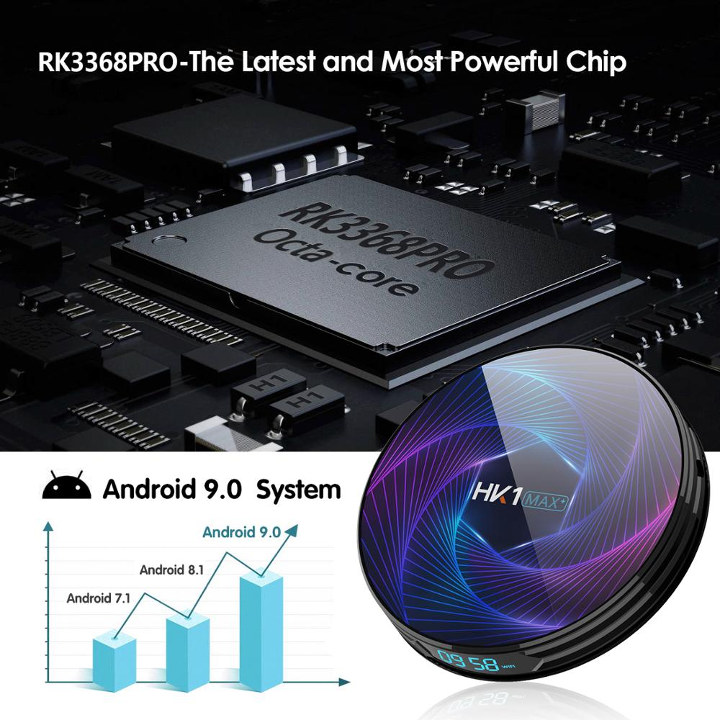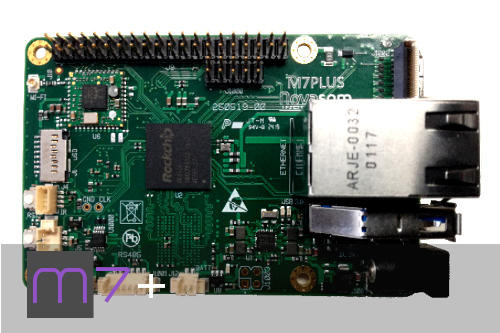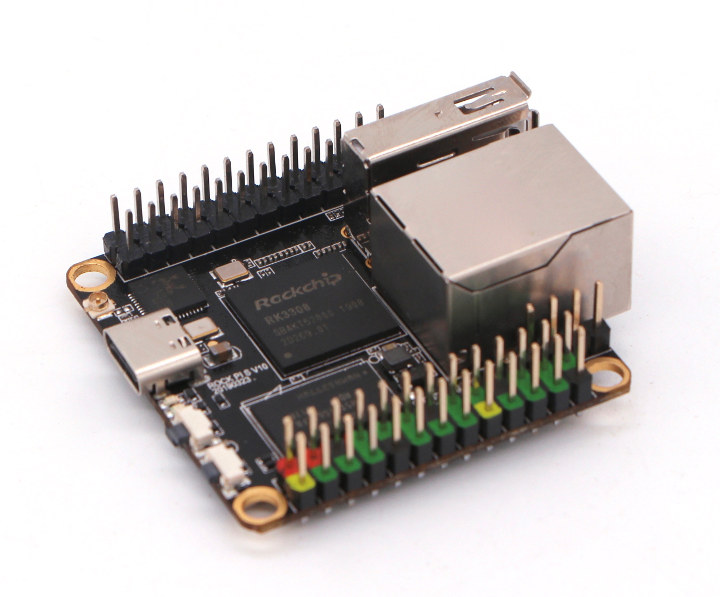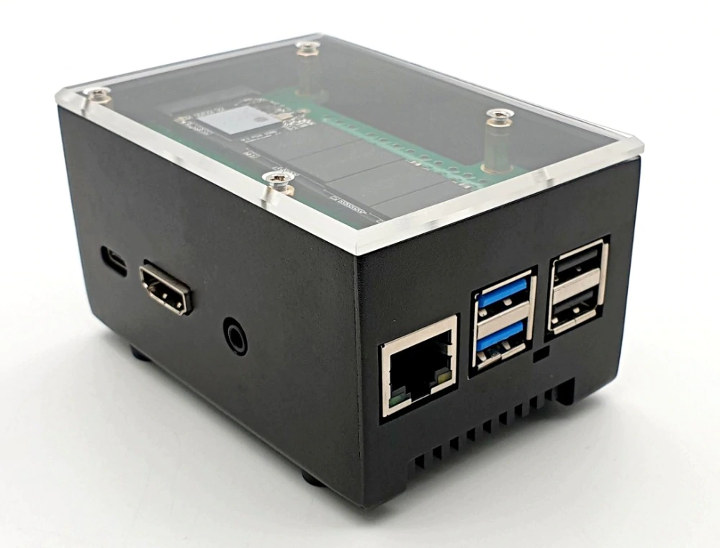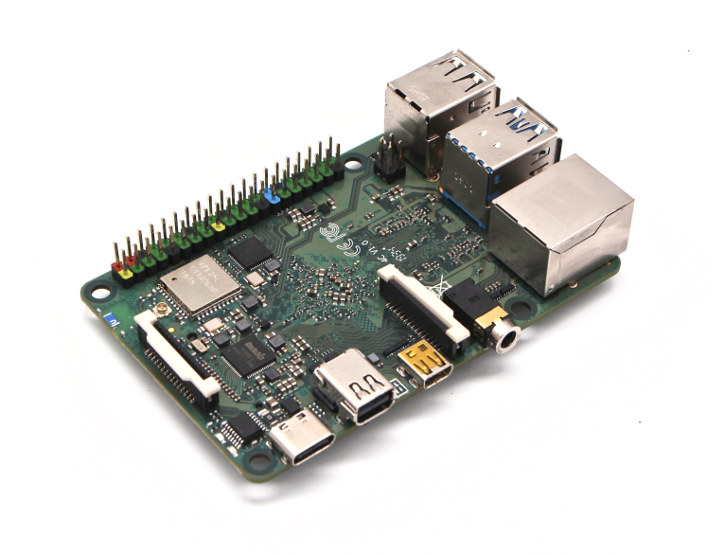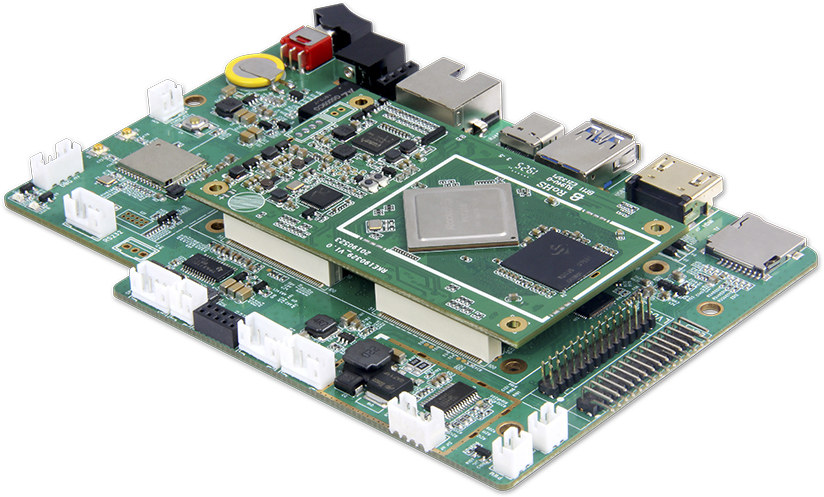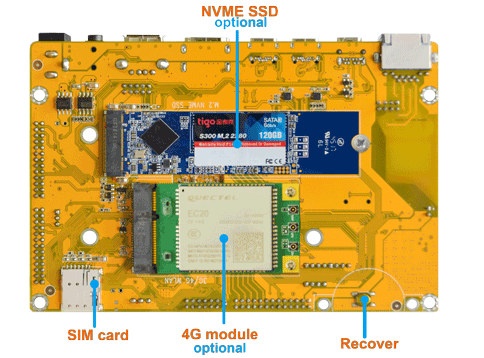Rockchip RK3368 octa-core Cortex-A53 processor @ 1.2 GHz was introduced in 2015 mostly in TV boxes running Android 5.1 such as Beelink i68 or Tronsmart Orion R68. Unsurprisingly we don’t read much about new Rockchip RK3368 products four years later. But Rockchip appears to have launched a RK3368 “refresh” with RK3368PRO processor equipped with most of the same features, plus the addition of a USB 3.0 interface, and HDR support. The company also updated software support to Android 9.0 Pie. We don’t actually have much information about the processor as we learned about it via a listing on Aliexpress for HK1 MAX PLUS TV box with the following (preliminary) specifications: SoC – Rockchip RK3368PRO Octa-Core Arm Cortex-A53 @ 1.5 GHz with Imagination PowerVR G6110 GPU System Memory – 4 GB DDR3 Storage – 32GB, 64GB, or 128GB flash; MicroSD card slot Video Output – HDMI 2.0a up to 4K @ […]
Novasom M7+ SBC Adds FFC HDMI Connector, USB & RS-485 Headers, Improves on Raspberry Pi 3 SW Compatibility
We previously wrote about Novasom M7 Rockchip RK3328 SBC being promoted as a drop-in replacement for Raspberry Pi 3 in industrial projects. That’s despite the different port arrangement, and instead, the company bases the claim on the availability of the 40-pin header, mounting holes matching RPI 3 board design, as well as software compatibility thanks to a library that allows customers to re-use the code written for Raspberry Pi boards. Based on feedback from customers, the company has made some changes to their design and launched Novasom M7+ SBC, and made several improvement to the software to be even more compatible with Raspberry Pi 3 board. Specifically there are five changes: Ability to power the board via the USB type-A port (5V) as an alternative to the 12V power barrel jack Stronger Backlight Driver for display up to 6A @5V) t FFC cable for HDMI output – The dimension of […]
Rock Pi S mini SBC Now Available for $15 with 512MB RAM, 512MB SD NAND Flash, WiFi & Bluetooth
Rock Pi S is a tiny single board computer powered by Rockchip RK3308 quad-core Cortex-A35 processor coupled with up to 512MB RAM, up to 1GB SD NAND flash, as well as a USB port, Fast Ethernet & optional WiFi & Bluetooth connectivity which was announced to sell for as low as $9.90 with 256MB RAM, 256MB flash and no wireless module. Seeed Studio has now started to take pre-orders for Rock Pi S with the board selling for $14.90 with 512 MB RAM, 512MB SD NAND flash, WiFi & Bluetooth. Shipping is scheduled to start on October 15th. [Update: Seeed Studio has also listed the 256MB RAM version of the board for $9.90] Rock Pi S specifications as currently sold on Seeed Studio: SoC – Rockchip RK3308 quad-core Arm Cortex-A35 processor @ up to 1.3 GHz with built-in VAD (Voice Activity Detector) System Memory – 512MB RAM Storage – MicroSD […]
ecoPI STARTER is a Cute Mini PC Kit Based on Rock Pi 4 SBC with Optional M.2 NVMe SSD
Rock Pi 4 is an affordable single board computer inspired by Raspberry Pi 3 Model B, but equipped with a more powerful Rockchip RK3399 hexa-core processor, and selling for around $80 with 4GB RAM, Gigabit Ethernet, and 802.11ac + Bluetotoh 5.0 wireless module. I’ve just come across ecoPI STARTER mini PC kit for the board with an aluminum case that can also fit an M.2 extension board to add an M.2 NVMe SSD card. The kit comes with an aluminum housing, an acrylic cover, some screws, bolts and silicon feet, and short ribbon cables for M.2 card. The acrylic cover is designed to let the WiFi & Bluetooth signal go through, but I’m not so confident the case won’t cause issue with WiFi. It’s currently sold for $16.50 on Aliexpress. You’ll also need to get Rock Pi 4A or 4B for $40 and up, M.2 Extension board ($8.39), heatsink ($8.39), […]
Rock Pi 4C SBC to Support Dual Display Setups via micro HDMI and mini DP Ports
Rockchip RK3399 powered Rock Pi 4 SBC was introduced at the end of 2018 and followed nearly exactly Raspberry Pi 3 Model B form factor just with a more powerful processor, GPU, as well as more memory depending on which model you purchase. But in June 2019, the Raspberry Pi foundation launched Raspberry Pi 4 SBC with a much faster processor and many of the same ports as its predecessor except for support for two HDMI displays via micro HDMI ports. Radxa has now followed suit with Rock Pi 4C which offers two modern video outputs, but with a twist as the upcoming SBC combines one micro HDMI port with one mini DP port. Rock Pi 4C was introduced at the XDC 2019 conference where open-source graphics developers meet, and Radxa was a “supporter”. The company explains Rock Pi 4B uses RK3399’s USB type-C controller for the two USB 3.0 […]
NanoPi M4V2 Metal Case Kit Review – Part 1: Unboxing and Assembly
Earlier this month FriendlyELEC released two new products namely NanoPi M4 metal case with heatsink and optional NVMe SSD adapter, and NanoPi M4V2 SBC, a minor upgrade to the original Rockchip RK3399 powered NanoPi M4 board with faster LPDRR4 memory, the addition of power & recovery buttons, and microphone input is now inside the audio jack instead of solder pads. I received both this weekend, in the first part of the review I’ll show the items part of the package and then show how to assemble the kit. In the second part, I’ll focus on the new features of the board like memory bandwidth, as well as the thermal performance of the complete solution in both Android and Linux. Unboxing Instead of one kit, I actually received two. One kit basically includes NanoPi M4V2 board with internal antennas (which we won’t use here), and the metal case which comes with […]
Geniatech SOM3399 RK3399 SoM Complies with 96Boards System-on-Module Specification
96boards System-on-Module specification was introduced last April together with their first SOM-CA (2x board-to-board connectors) and SOM-CB (4x board-to-board connectors), namely TB-96AI & TB-96AIoT modules powered by respectively AI capable Rockchip RK1808 and RK3399Pro processors that would fit into a compatible baseboard. Those started to ship early this summer, and there’s now a new module that complies with 96Boards SoM specification courtesy of Geniatech SOM3399 powered by a Rockchip RK3399 hexa-core processor without the extra NPU / AI accelerator found in the aforementioned modules. Geniatech SOM3399 Specifications: SoC – Rockchip RK3399 dual-core Cortex-A72 up to 1.8GHz, quad-core Cortex-A53 up to 1.4GHz, Mali-T860 MP4 GPU with support for OpenGL ES1.1/2.0/3.0, OpenCL1.2, DirectX11.1 System Memory – 2GB LPDDR4 (4GB as option) Storage – 8GB eMMC flash (16, 32, and 64GB as option) Board-to-board connector – 4x 100-pin high-speed connectors (X1, X2, X3, and X4 as defined by the spec) with USB 3.0, […]
Boardcon Idea3399 Features-Rich SBC Comes with M.2 NVMe SSD and 4G LTE PCIe Sockets
Back in 2017, Boardcon introduced EM3399 single board computer powered by a Rockchip RK3399 processor through the company’s PICO3399 SO-DIMM system-on-module. They’ve now designed another RK3399 SBC – Idea3399 – comprised of a baseboard and module, but instead of re-using the SO-DIMM module, CM3399 system-on-module with castellated holes was used instead. The new board comes with many of the same features as their first board but adds an M.2 NVMe SSD slot and mPCIe socket for 4G LTE modem on the back of the board. CM3399 SoM Key features and specifications: SoC – Rockchip RK3399 dual Cortex-A72 @ 1.8GHz + quad Cortex-A53 @ 1.4GHz System Memory – 4GB LPDDR4 Storage – 8GB eMMC flash 202 castellated pin (1.3mm pitch) with USB2.0 host, USB3.0 host, USB OTG, UART, MIPI, Ethernet, SPI, HDMI out, I2C, I2S, PCI Express, SDIO, SD/MMC, eDP, Camera, PWM, ADC IN, etc… Power – Supply Voltage: 5V; RK808 […]


